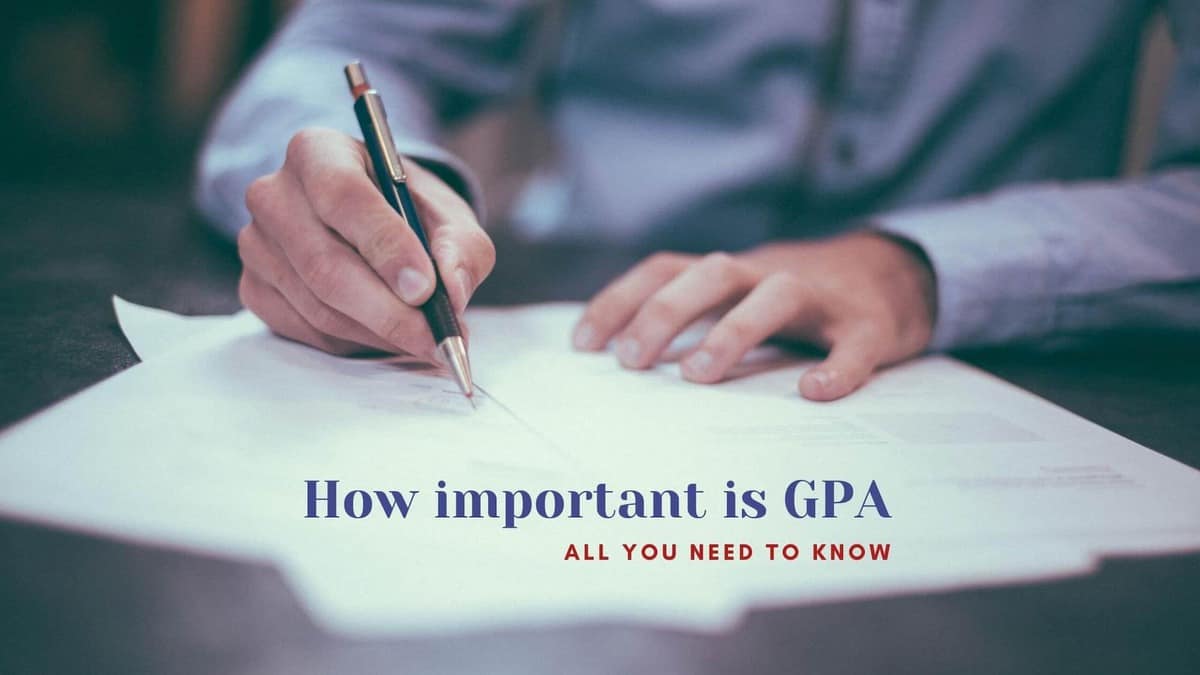GPA is important because it helps open more opportunities for you in the initial stage of your career. It contributes significantly to the initial impression that you give to the admissions office at universities or potential recruiters.
While GPA is not a measure of intelligence, most people have assume that someone with good GPA is more likely to be a fast learner. They are also likely to relate high GPA with good work ethic and organization skills.
So, although GPA isn’t everything, it is certainly a key factor that universities and job recruiters consider when ranking candidates fresh out of high school or university. In other words, GPA is particularly important if you are applying to top universities or reputable companies but don’t have extracurricular activities or experiences that help you stand out from others.
Getting a good GPA doesn’t always have to be as difficult as you may think. It’s a case of understanding the system and then finding the right ways to beat it. We have numerous guides to help you get good grades. For example, here’s a very simple trick to help you improve your grades with very little additional effort.
If you’re still not convinced why GPA is important, here are some other reasons.
Table of Contents
It helps you avoid getting filtered out
Some university admissions offices have started automating the admissions processes using algorithms. There are an increasing number of cases where GPA is used as a filtering tool to cut down the number of applications that need to be reviewed manually.
Shows that you are dedicated and commitment
Most admissions office staff and job recruiters appreciate the level of dedication needed to get a good GPA. Getting a good GPA is not always difficult. Where most students falter is with the commitment required to get a good GPA. This requires consistency and fighting procrastination, which is a difficult ask for most students (given the number of distractions they need to overcome.)
Confirms that you have a strong foundational knowledge
Having a good GPA shows recruiters that you have a good understanding of the theory related to the field you are in. This foundational knowledge would often be fairly basic for direct application to a real-world context. However, without this starting point, you can’t be taught more complex tasks.
Suggests that you are likely to be well-organized
Some of the factors that lead to poor grades include procrastination, forgetfulness, and low attention span. What these factors have in common is that they point to a lack of organization skills and recruiters may be quick to jump to such a conclusion when they see a low GPA.
Gives an indication of your work ethic and professionalism
A good GPA shows that you are willing to put in the effort required to stand out from mediocrity. If you haven’t heard of the 80/20 principle (aka Pareto principle), it’s the idea that to achieve 80% of something, you only need 20% effort. However, to go beyond that and complete the remaining 20%, you are likely to need to put in 80% effort.
Can I get into university with bad grades?

Yes, you can get into university even with bad grades if you have other impressive aspects that stand out. However, a lot of the good schools tend to place more importance on your grades and GPA than average ones.
Most universities understand that grades are not a direct measure of intelligence – instead, they are an indicator of hard work. So, if you have bad grades, try to highlight some other aspects or achievements that show off your individuality. Here are some examples of things that help you get into university even with bad grades.
Personal statement
Write an exceptional personal statement based on your unique experiences in a way that leaves the reader wanting to talk to you in person. This is of course, easier said than done. However, we do have a dedicated guide on how to make awesome personal statements to help you get started.
Work experience
This can include part-time work experiences or even experiences in completely unrelated fields or industries. What matters here is that you try and package your experience in a way that highlights the ‘transferability of your skills’. Here are some examples of how you can take seemingly unimportant part-time work and use it to your advantage.
- You might have walked dogs for your neighbors – include this as a part-time job and say that this experienced helped you develop patience and organization skills
- You may have done some babysitting – this is e a part-time a job that would have certainly taught you the importance of responsibility and accountability
Other life experiences
If you are applying to an undergrad program, or your first job after graduating, chances are high that you don’t have significant work experiences. If you find yourself in this situation, make sure that you draw attention to other life experiences. This can help you stand out from other candidates, as shown in these examples.
- You may have helped at the soup kitchen a few times – put that down as volunteering work
- You might be assisting your local pet shelter – that can be included as volunteering work too
- Even your travel to other places can be mentioned in your personal statement if you gained something from it. Perhaps you improved your cultural understanding, or maybe it expanded your worldview and knowledge
- Maybe you had a family member who was ill, and you had to take some time off school to help them. You can definitely include this as well in your personal statement. The aim isn’t to gain sympathy but to highlight how you have become a stronger person as a result of facing this hardship.
Extracurricular activities
Universities in the US place a high level of importance on extracurricular participation when reviewing applications. This isn’t something new. Here’s a study from 1995 which concluded that participation in extracurricular activities has correlated with higher levels of academic achievement. Since then, this has only become even more important in recent times. This is due to the growing realization that not everyone performs well on graded exams. So, even if you don’t have the best of grades, including a good range of extracurricular activities on your application can help improve your chances of getting accepted.
Something extraordinary
You could also just do something completely out of the box and blow your competition. There are many examples of people who made a website to increase their chance of landing a job. We can’t really spell this out for you because what would be considered ‘extraordinary’ depends on the field that you are in, what expertise you have and various other factors. However, here are some more examples to give you some inspiration.
Can I study masters with low GPA?
Yes, you can absolutely apply to and join a master’s degree program even with a low GPA. You just need to make sure that you have a strong personal statement to support your application. We have gone over this in further detail in the previous section. However, a low GPA makes it less likely for you (statistically) to get into a top university.
What is a good GPA in university?
A GPA above 3.5 is going to be good enough for most universities. Having said that, the reality is that this is a subjective question. Grad school admissions committees or job recruiters do not view all universities equally. A GPA of 3.6 from a top school like the Ivy League universities would be viewed more favorably by these people than a GPA of 3.8 from a fairly unknown local community college. This isn’t to disparage community colleges. It’s just that recruiters are well aware that the former type of schools have notoriously difficult programs and coursework compared to the latter.
A GPA of 3.0 is close to statistical average across all universities in the USA, but it would still be relatively good in most contexts. This is especially if you include other credentials in your application. Anything lower than a GPA of 3.0 would be considered mediocre and won’t help you stand out easily during the next immediate stages of your higher education or initial career.
What is a good GPA for PhD?
If you’re thinking of applying to grad school, a GPA just shy of 3.5 would be fine for most universities as this is usually where they set their bar. However, anything less than 3.7 is going to hurt your chances if you’re looking to get into a good program at a reputed institution.
Having said that, as we’ve mentioned earlier, GPA isn’t everything and those running the admissions offices at grad school are aware of this. So, if you have a GPA less than 3.5, make sure that you have a strong overall application with a good personal statement.
PhD programs also rely heavily on research, so you need to put a spotlight on your previous coursework and experiences that are relevant to our chosen field and show off your research skills. There are also some schools that emphasize quality over quantity. This involves looking at the breakup of which specific classes you took, and which courses you did well in. This can give the admissions committee a better idea of how suited you would be to specialize further in the field that you are applying to.
Is GPA important for jobs?

Yes, GPA is important for jobs if you are applying right after graduating from high school or university. However, depending on the organizational culture of the company, they might not give too much importance to it. This is especially if you stand out in other ways, such as through some extra-curricular or social activities which you may have done and can put down in your resume.
Without such experiences to beef up your resume, your GPA becomes the only basic indicator of your potential. After you have worked for at least a year or more and gained some real-world experience, you should be drawing more attention to these experiences in your resume. At that point, your GPA would take a back-seat and will not be as important in job applications.
Can you round up GPA on resume?
No, you should not round up GPA on resume, or anywhere else for that matter. The accepted practice when it comes to GPA is that they should be reported exactly as they appear on your transcripts, reports or certificates. This is the ideal way to avoid potential misunderstandings.
However, if your transcript reports your GPA beyond 2 decimal places, then it would be acceptable to round it to 2 decimals to make your resume cleaner. Even in this situation, we would suggest that you round down the figure, rather than rounding it up. The aim remains the same, which is to avoid giving the wrong impression to admissions committees or recruiters (if they happen to come across your real GPA later).
For instance, reporting your GPA as 3.6 isn’t really all that better than the 3.56 that your certificate might state. Reporting it factually as the latter shows a greater level of honesty and transparency which recruiters appreciate.
References
National Center for Education Statistics (1995) Extracurricular Participation and Student Engagement. Available from: https://nces.ed.gov/pubs95/web/95741.asp [Accessed 09 Jan 2022]
Swauger, S. (2021) The next normal: Algorithms will take over college, from admissions to advising. The Washington Post [Online]. Available from: https://nces.ed.gov/pubs95/web/95741.asp [Accessed 07 Jan 2022]

